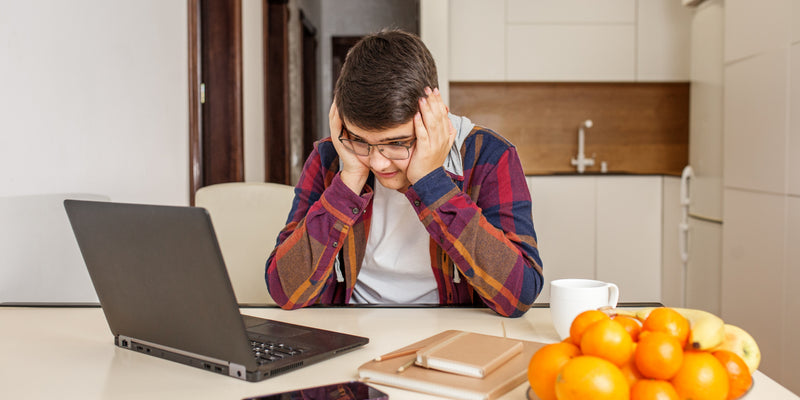Anxiety has become an all-too-familiar companion in the modern world. From the pressures of work and personal relationships to the constant exposure to information overload, it's no wonder that anxiety disorders are on the rise. However, with the right strategies and treatment approaches, it is possible to overcome it.
Therefore, let us take a look at five strategies that could help you with anxiety. These strategies are backed by research and have proven to be effective in helping individuals overcome anxiety and lead fulfilling lives. Whether you have been diagnosed with an anxiety disorder or simply find yourself grappling with occasional bouts of anxiety, these strategies can provide you with the tools and techniques to navigate your journey towards inner peace.
We understand that anxiety is a complex and deeply personal experience. What works for one person may not work for another, and that's why we have curated a diverse range of strategies that can be tailored to suit your individual needs. Each strategy offers a unique perspective and approach, allowing you to find the ones that resonate most with you.
So, if you're ready to take the first step towards overcoming anxiety and reclaiming your life, let’s dive into these five self-care practices. By integrating these strategies into your life, you will develop a holistic approach that addresses the root causes of anxiety and empowers you to break free from its grip.
What Is Anxiety?

Anxiety is a mental health condition characterized by persistent fear or worry. It surpasses mere feeling of stress or apprehension in certain situations; rather, it is a chronic state of unease that significantly impacts daily functioning. Anxiety disorders affect millions of people worldwide and can take many forms, such as generalized anxiety disorder, social anxiety disorder, panic disorder, and specific phobias.
Living with anxiety disorder can be incredibly challenging. The constant fear and worry make it difficult to concentrate, sleep, and carry out normal activities. Relationships may suffer, and individuals with anxiety often find it hard to maintain a regular routine or pursue their goals and ambitions.
What Causes Anxiety?
Anxiety manifests as a complex and multifaceted disorder, with various contributing factors. One potential cause of anxiety is genetics. Research suggests that individuals with a family history of anxiety disorders are more likely to develop the condition themselves, indicating a strong genetic component.
Another contributing factor is brain chemistry. Neurotransmitters, such as serotonin and dopamine, play a crucial role in regulating mood and emotions. An imbalance in these chemicals can lead to heightened anxiety levels.
Traumatic life events can also trigger the development of anxiety disorders. Experiencing events like physical or emotional abuse, the loss of a loved one, or a serious accident can leave a lasting impact on the individual's mental well-being, leading to chronic anxiety.
Substance withdrawal or misuse is another factor that can cause anxiety. Certain substances, such as alcohol, benzodiazepines, or opioids, can alter brain chemistry and increase the risk of anxiety disorders. Additionally, when individuals abruptly stop using these substances, they may experience withdrawal symptoms, including anxiety.
Furthermore, certain medical conditions can contribute to the development of anxiety. Conditions like thyroid disorders, heart disease, or respiratory illnesses can cause physiological changes in the body, triggering anxiety symptoms.
What Are Symptoms of Anxiety?
Symptoms of anxiety can differ among individuals but commonly include excessive worry, restlessness, irritability, physical sensations like racing heartbeat or shortness of breath, sleep disturbances, cognitive difficulties, muscle tension, avoidance behavior, fatigue, and panic attacks. It's important to note that occasional anxiety is normal, but when these symptoms become persistent, excessive, and disrupt daily life, they may indicate an anxiety disorder.
Types of Anxiety Disorders

There are several types of anxiety disorders, each with its own unique characteristics and symptoms. Understanding these differences is important to accurately identify and treat individuals experiencing anxiety symptoms.
Generalized Anxiety Disorder (GAD) is characterized by excessive worrying and fear about everyday situations. People with GAD often experience chronic anxiety that persists for at least six months. Symptoms include restlessness, fatigue, difficulty concentrating, muscle tension, and sleep disturbances. These symptoms can significantly impact daily functioning, affecting work productivity, relationships, and overall quality of life.
Social Anxiety Disorder, also known as social phobia, is characterized by an intense fear of social situations. Individuals with social anxiety disorder often have a fear of being judged or embarrassed in social settings. This can lead to avoidance of social situations and isolation. Symptoms may include blushing, trembling, sweating, rapid heartbeat, and difficulty speaking. Social anxiety disorder can greatly impact a person's ability to form and maintain relationships, participate in social activities, and may even affect their academic or professional pursuits.
Panic Disorder is characterized by sudden and recurrent panic attacks. Panic attacks are intense episodes of fear or discomfort that reach a peak within minutes. Symptoms may include a racing heart, shortness of breath, chest pain, dizziness, trembling, and a fear of losing control or dying. Panic disorder can greatly impact daily functioning as individuals may develop a fear of having another panic attack and may begin to avoid certain situations or places that they associate with panic attacks.
5 Ways to Manage Anxiety

Anxiety is a prevalent mental health condition that can significantly impact an individual's daily life. It can manifest as restlessness, excessive worrying, and physical symptoms like rapid heartbeat or sweating. While managing anxiety may seem challenging, there are various techniques and strategies that can help individuals cope with their anxiety effectively.
-
Slow Breathing
Slow breathing, also known as breath control or deep breathing, is a technique that involves taking deliberate, slow and deep breaths. This practice has been found to have numerous benefits for both the mind and body.
One of the major advantages of slow breathing is its ability to promote a sense of calmness and reduce anxiety. When we practice slow breathing, it triggers the body's relaxation response, which helps to switch off the stress response. By intentionally taking slow and deep breaths, we send a signal to our brain that there is no immediate danger, thus reducing feelings of anxiety and tension.
The process of slow breathing typically involves finding a quiet and comfortable place to sit or lie down. Then, individuals are directed to take a slow and deep inhalation through their nose, allowing their abdomen to fully expand. This is followed by a slow exhalation through the mouth, allowing the abdomen to return to its natural position. This cycle is repeated several times, focusing on the sensation of the breath entering and leaving the body.
Through slow breathing, individuals are able to activate their body's relaxation response, which is responsible for lowering heart rate and blood pressure, reducing muscle tension, and increasing feelings of relaxation. This technique also helps to regulate the autonomic nervous system, leading to an overall sense of calmness and reduced anxiety.
-
Progressive Muscle Relaxation
Progressive Muscle Relaxation (PMR) is a relaxation technique that involves tensing and relaxing specific muscle groups throughout the body to reduce stress and promote overall relaxation. To perform PMR, follow these steps:
- Find a quiet location: Begin by finding a calm and quiet place where you can relax without distractions. This could be a peaceful room in your home or any other serene environment.
- Close your eyes: Sit or lie down in a comfortable position. Close your eyes gently to help deepen your relaxation experience and block out any external stimuli.
- Tense and relax: Start by focusing on your toes. Curl them tightly and hold the tension for about three seconds. Then, release the tension suddenly, letting your toes fully relax. Experience the sensation of the tension melting away.
- Move through muscle groups: Continue this process, gradually working your way up through different muscle groups. Progress to your feet, calves, thighs, buttocks, abdomen, chest, arms, shoulders, neck, and finally, your face. Tense each muscle group for about three seconds before releasing.
- Hold tension: Remember to hold the tension but avoid straining or causing discomfort. The purpose is to create awareness of the tension and then release it gradually.
- Relax and breathe: After tensing and relaxing every muscle group, take a moment to focus on your overall relaxation. Breathe deeply and slowly, allowing your body to sink deeper into a state of calmness.
-
Stay in the Present Moment
Staying in the present moment is crucial for our mental well-being and overall happiness. It allows us to fully experience and appreciate the here and now, rather than getting caught up in worries about the future or dwelling on the past. By staying present, we can better manage anxiety and stress and cultivate a greater sense of peace and contentment.
One effective strategy for staying in the present moment is practicing mindfulness meditation. This involves intentionally paying attention to the present moment without judgment. Through meditation, we learn to observe our thoughts and emotions without getting swept away by them. By focusing on our breath or a specific point of focus, we train our minds to stay present and grounded.
Anxiety often causes our thoughts to fixate on a negative future that may never come to pass. By regularly practicing meditation, we can develop the ability to bring our attention back to the present moment, thus reducing anxiety's grip on our minds.
It's important to note that staying present doesn't mean we ignore the future or responsibilities. It simply means that we're fully engaged in what we are currently doing, rather than consumed by worries or anticipation. By intentionally bringing our attention to the present moment, we can fully appreciate the joys and experiences of life, reducing anxiety and finding peace in the now. So, take a moment to breathe, focus on your senses, and bring your attention back to the present.
-
Use Aromatherapy
Aromatherapy is a natural and effective approach to address anxiety. It involves the use of essential oils, incense, and candles to promote relaxation and alleviate stress. The benefits of aromatherapy for anxiety are numerous and the techniques are easy to incorporate into daily life.
One of the key benefits of aromatherapy is its ability to calm the mind and relax the body. The scents of essential oils such as lavender, chamomile, and sandalwood have been found to have a soothing effect on the nervous system. These natural scents work by stimulating the olfactory system, which is directly connected to the limbic system in the brain that controls emotions and memories. The inhalation of these scents triggers the release of certain chemicals in the brain, such as serotonin and endorphins, which are responsible for promoting feelings of calmness and relaxation.
There are various ways to incorporate aromatherapy into daily life. One of the most popular forms is through the use of essential oils. These oils can be diffused in a room, added to a warm bath, or applied topically after diluting them with a carrier oil. Another form of aromatherapy is through incense, which can be burned to release fragrant scents. Candles scented with essential oils are also commonly used in aromatherapy.
-
Exercise Regularly
Regular exercise plays a crucial role in managing anxiety by providing a range of benefits that positively impact mood, personality traits, and the prevention of anxiety disorders. Engaging in physical activity on a regular basis has been shown to have a significant impact on reducing anxiety symptoms and promoting overall mental well-being.
Exercise has a profound effect on mood as it increases the production of endorphins, which are known as "feel-good" hormones. These endorphins help to alleviate feelings of stress, anxiety, and depression, leaving individuals with a sense of calm and contentment. Additionally, exercise helps regulate the release of stress hormones, thereby reducing tension and promoting relaxation.
Participating in regular exercise also enhances personality traits that are beneficial in managing anxiety. It helps to improve self-confidence, self-esteem, and body image, as people become more aware of their physical capabilities and achievements. Exercise also provides a sense of accomplishment and mastery, creating a positive impact on one's mindset and self-perception.
The prevention of anxiety disorders can be achieved through regular exercise due to several reasons. Firstly, exercise serves as a distraction from daily worries and intrusive thoughts, diverting attention to physical exertion and the present moment. Secondly, engaging in physical activities often involves social interaction and camaraderie, promoting a sense of belonging and reducing feelings of loneliness or isolation, which are risk factors for anxiety disorders. Lastly, exercise improves physical health by reducing the risk of chronic diseases, promoting better sleep patterns, and increasing energy levels, all of which contribute to a lower vulnerability to anxiety.
Takeaway
While anxiety has become increasingly prevalent in our modern society due to various stressors, it is essential to recognize that there are effective strategies and treatment approaches available to overcome it. The pressures of work, personal relationships, and information overload can contribute to the development of anxiety disorders, but they do not have to define our lives. By implementing these five strategies and seeking appropriate treatment, individuals can regain control and find relief from the grip of anxiety. It is a journey that requires patience, self-care, and professional support, but it is undoubtedly possible to overcome anxiety and lead a fulfilling life.
Renpho Health Tips
-

Say Goodbye to Joint Pain: The Power of Healing Oils
April 3, 2024
Read more >
-

Understanding Acute Migraine: Causes, Symptoms, and Treatment Options
April 3, 2024
Read more >
-

Understanding Academic Stress in Students: Causes, Effects, and Solutions
April 1, 2024
Read more >
-

Blossoming Relief: Unveiling the Headache-Soothing Powers of Spring Flowers
March 27, 2024
Read more >
-

5 Effective Self-Help Strategies for Anxiety Relief
March 25, 2024
Read more >
